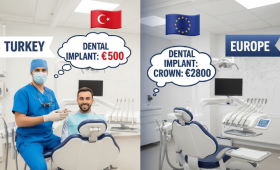What is a Dental Crown?
A dental crown is a prosthesis that is placed over a damaged, decayed, fractured, or aesthetically unappealing tooth, completely covering it. These crowns aim to restore both the function and aesthetic appearance of the tooth.
Dental crowns are specially designed and custom-made to look and feel like a natural tooth. Various material options are available, such as porcelain, zirconium, and porcelain-fused-to-metal. Dental crowns are widely used to extend the life of a tooth and provide an aesthetic smile.
Who can get a Dental crown?
A dental crown is a suitable solution for many different dental problems. Patients who have large cavities or fractures in their teeth, have experienced too much tooth loss to be corrected with a filling, have a weakened tooth after a root canal treatment, have aesthetic concerns due to shape or color irregularities, and those who want a bridge prosthesis for a missing tooth can get a dental crown.
Additionally, teeth that are worn down due to teeth grinding habits can also be protected with crowns. The dentist evaluates the patient’s oral health to determine the most suitable treatment plan.
What is a Porcelain Crown?
A porcelain crown is one of the most frequently preferred types of crowns in aesthetic dentistry. These crowns are made from ceramic materials that do not contain a metal substructure and offer an appearance closest to a natural tooth thanks to their light permeability.
With their light-reflecting properties and natural color tones, porcelain crowns provide excellent aesthetic results, especially for front teeth. These crowns have a structure that fits perfectly on the tooth, do not discolor, and maintain their durability for many years. Porcelain crowns meet both aesthetic and functional needs.
What is a Zirconium Crown?
A zirconium crown is a metal-free crown type that has gained popularity in recent years. Since zirconium is a white-colored and biocompatible material, it is very successful aesthetically and does not cause allergic reactions. Thanks to its light permeability, it offers an appearance very close to natural teeth. Due to its high durability, it can be safely used on both front and back teeth. It is highly resistant to chewing forces and provides a long-lasting solution.
What is a Porcelain-Fused-to-Metal Crown?
Porcelain-fused-to-metal crowns are a traditional method and have a metal framework in their substructure to provide durability. Porcelain layers in the color of the tooth are applied over this metal framework. Metal-supported crowns are very resistant and durable against chewing forces, so they can be preferred, especially for back teeth. However, aesthetically, the metal substructure does not transmit light, which can cause a dark line at the gum line, slightly affecting the natural appearance.
How does the dental crown treatment process work?
The dental crown treatment process is usually completed in a few sessions. In the first session, the tooth to be crowned is shaped by reducing its size. This procedure is painless as it is performed under local anesthesia. An impression of the tooth is taken, and a temporary crown is placed. In the second session, the permanent crown prepared in the laboratory is tried on the tooth, and the color and shape harmony are checked. If everything is in order, the crown is fixed to the tooth with a special adhesive, and the treatment is completed.
How long does the treatment take?
The duration of dental crown treatment depends on the number of crowns to be applied and the working speed of the laboratory. The treatment usually takes two or three sessions and is completed within one to two weeks. If additional treatments for the patient’s oral health (such as gum treatment, root canal treatment) are required, this period may be extended. The most accurate time information is determined after your first examination with your dentist.
Is the Dental Crown Procedure Painful?
Pain during the dental crown procedure is minimal, and since it is usually performed under local anesthesia, the patient does not feel any pain. After the first session, there may be a slight sensitivity or throbbing in the teeth where the temporary crown is placed. This condition can be easily controlled with painkillers recommended by the dentist. After the permanent crown is placed, the sensitivity usually disappears completely.

What is the lifespan of dental crowns?
The lifespan of dental crowns varies depending on the type of crown, the quality of the material, the patient’s oral hygiene, and chewing habits. Generally, a well-cared-for porcelain or zirconium crown can last for 10 to 20 years or even longer. Regular brushing, flossing, and periodic dental check-ups are very important to extend the life of the crown.
How Do Dental Crown Prices Vary?
Dental crown prices vary greatly depending on the type of material used (zirconium, porcelain, metal-supported), the number of crowns to be made, the experience of the dentist and the clinic, the geographical location, and whether additional treatments (such as root canal treatment, filling) are required. For the most accurate price information, a detailed examination and a personalized treatment plan should be requested from the dentist.
What is the Difference Between a Dental Crown and a Porcelain Veneer?
A dental crown completely encircles a tooth, while a porcelain veneer is a thin layer bonded only to the front surface of the tooth. A veneer is mostly used for aesthetic purposes to correct minor color irregularities, small fractures, or gaps, while crowns provide a functional and aesthetic solution for teeth with greater substance loss or impaired chewing function. More abrasion of the tooth is required for a crown, while minimal abrasion is performed for a veneer.
Is a Dental Crown a Permanent Procedure?
Yes, a dental crown is a permanent procedure. The shaping of the tooth for the crown is an irreversible process because some substance is abraded from the surface of the tooth. Therefore, a tooth that has had a crown placed will always need a crown from now on. When the lifespan of the crown is over or it is damaged for any reason, it needs to be replaced with a new one.
Can a Dental Crown be Removed?
A dental crown can be removed by a dentist using special tools. To remove the crown, it usually needs to be cut or fractured. Therefore, it is not possible for the patient to remove the crown on their own. The crown is removed by the dentist when it is damaged or when a problem occurs in the underlying tooth, and a new one is placed in its place.
Do Crowned Teeth Decay?
The crown itself does not decay, but the natural tooth under the crown can. If there are gaps between the crown and the tooth or if the crown does not fit perfectly on the gum line, bacteria can accumulate in these areas and cause decay. Therefore, it is vitally important to brush crowned teeth regularly and meticulously, use dental floss, and go for periodic dental check-ups, just like with natural teeth.
Can Gum Problems Occur with Crowned Teeth?
Crowns that are not made with quality or do not fit perfectly on the gum line can cause gum inflammation and recession. This situation leads to bacterial accumulation at the edges of the crown. However, crowns that are applied with a correct impression and without damaging the gums protect gum health. Regular oral care after crowning is a critical step to prevent gum problems.
Do Crowned Teeth Cause Pain?
Pain in a crowned tooth can be caused by slight sensitivity after the procedure, and this is usually temporary. If the pain persists, there may be a problem such as decay, inflammation, or nerve damage under the crown. In this case, the dentist removes the crown to identify the underlying problem and usually performs a root canal treatment. A new crown is placed after the cause of the pain is resolved.
Does the Color of Crowned Teeth Change Over Time?
Modern crown materials such as porcelain and zirconium are highly resistant to discoloration. While substances like coffee, tea, and cigarettes can stain natural teeth, these crowns do not easily stain. However, the natural teeth around the crown can change color, which can cause a color difference over time. Therefore, it is important to regularly clean and whiten the natural teeth to preserve the aesthetic.
What Should Be Done if a Crown Falls Off?
If a crown comes loose and falls off, it should be carefully stored and the dentist should be consulted as soon as possible. You should not try to re-bond it yourself. The dentist re-evaluates the crown and, if necessary, re-fixes it with a special adhesive. If the crown is broken or damaged, a new crown may need to be made. The reason for the crown falling off (weakening of the adhesive, decay in the underlying tooth) is examined.
Is it Difficult to Eat with Crowned Teeth?
After the crowning procedure is completed and the dentist’s approval is received, there is no difficulty in eating with crowned teeth. Crowns are designed to perform the chewing function in the best possible way. However, there may be an adjustment period for the first few days. It is especially good to avoid consuming hard and sticky foods with a newly bonded crown to keep it intact.
Do Crowned Teeth Look Natural?
Thanks to modern dental techniques and high-quality materials, crowned teeth can have an extremely natural appearance. Materials like zirconium and full porcelain mimic the natural tooth in terms of light permeability and color tone. The dentist custom-designs the shape, size, and color of the crowns to be harmonious with the patient’s other teeth and facial features.
What Should Be the Condition of the Tooth Under the Crown?
The tooth to be crowned should not have decay, inflammation, or nerve damage. If it does, these problems must be addressed first. If a root canal treatment is required, this treatment is completed before the crown. The crown must be placed on a solid foundation, and the remaining healthy part of the tooth must be strong enough to support the crown. Otherwise, the crown may not be long-lasting.
Is it necessary to completely cut the tooth to make a crown?
To make a crown, the tooth does not need to be completely cut, but rather reduced in size and shaped to a certain extent. Some substance is abraded from around and on top of the tooth to create a space where the crown will fit perfectly. This procedure ensures that the crown looks like a natural tooth and does not take up unnecessary space in the mouth. Thanks to minimal abrasion techniques, the tooth structure is preserved as much as possible.
What is the Difference Between a Crown and a Bridge?
A crown is a prosthesis that covers a single tooth, while a dental bridge is a type of prosthesis used to replace one or more missing teeth. The bridge is supported by crowning the healthy teeth on both sides of the missing tooth. These supporting crowns carry the artificial tooth (pontic) that will replace the missing tooth. Both are used for aesthetic and functional purposes, but their areas of use are different.

What is the Most Important Factor Affecting Crown Prices?
The most important factor affecting crown prices is the type of material used. Aesthetic and durable materials like porcelain and zirconium can be more expensive than metal-supported crowns. Additionally, the number of crowns, the experience of the dentist, the geographical location of the clinic, and whether additional treatments (root canal treatment, filling) are needed are other important factors that directly affect the price.
Is Teeth Whitening Necessary for a Dental Crown?
Teeth whitening is not mandatory for a dental crown, but it is often recommended to be done before the crown for an aesthetic appearance. Since crowns are made to match your natural tooth color, if you want your teeth to be a whiter shade, a whitening procedure should be done first. This way, your crown is designed to be compatible with your new tooth color, and a unity is provided in your entire smile line.
Does Speech Change with Crowned Teeth?
After a crown is placed, especially for the first few days, a slight change in pronunciation or a feeling of foreignness may be experienced. This is usually temporary, and normal speech returns after the mouth and tongue get used to the crown. If the crown’s size or shape is very different, this adjustment period may be a little longer. Your dentist will make the most suitable design that will not affect your speech function.
Are Dental Crowns Placed on Children?
In children, temporary crowns (stainless steel crowns) are usually used to protect primary (baby) teeth. These crowns are made to prevent the premature loss of primary teeth that have large cavities or are fractured and to protect the space for the permanent tooth that will erupt from underneath. Permanent porcelain or zirconium crowns used in adults are applied after the tooth and jaw development is complete, which is usually after the age of 18.
What Should Be Done on the First Day After Crowning?
After the crown is cemented, it is important to avoid chewing and consuming hot/cold food and drinks for the first few hours. This allows the adhesive to fully harden. You can use the painkillers recommended by your dentist and continue your regular oral care. The slight sensitivity that may be experienced in the first few days is normal, but in case of severe pain or discomfort, you should consult your doctor.
How is the Teeth Grinding Problem with Crowned Teeth Solved?
Teeth grinding (bruxism) is a habit that can damage crowns. If this problem exists, the dentist should be informed before the crown is made. A clear appliance called a night guard is used to prevent teeth grinding. This guard prevents the crowns and natural teeth from wearing down. Bruxism treatment is important to extend the life of the crown.
Can a Digital Impression Be Taken for a Crown?
Yes, digital impression-taking methods are increasingly being used in dental crown treatment in recent years. With this method, a 3D image of the teeth is taken with a special camera, thus eliminating the discomfort caused by the traditional impression-taking method. Digital impressions offer more precise and faster results, which ensures that the crowns fit the tooth perfectly and are more successful aesthetically.
What Are The Options For Dental Veneer Packages In Alanya?
Dental veneers Alanya may be a wonderful option if you’re searching for a cosmetic dental treatment that may totally transform your smile. They resemble genuine teeth, which is why dental clinics employ the highest quality materials. Veneers are used to address a variety of cosmetic flaws, such as a tooth’s form or colour.
Furthermore, you have the option of selecting any shade of white to match the natural color of your teeth. Dental veneers might be an excellent option if you have dental crowding, asymmetrical teeth, discolored teeth, tooth traumas, or unattractive dental gaps. And it also comes up with affordable dental veneer packages in Alanya by Cure Holiday.
Veneers Alanya Package Inclusions
- Pre and post-operative consultations
- All clinic fees
- All medical fees and doctor fees
- Hotel accommodation
- Vip Transfer services (airport-hotel-clinic)
- Dental x-rays and anesthesia
What Influences The Cost Of A Dental Veneer Package In Alanya?
- How many teeth do you need to have veneers placed on?
- Which one do you want from a variety of veneer materials?
- What is your age?
- Your jaw’s adaptability
- The dentist’s qualifications and experience
- Services provided by the clinic
What Are The Benefits Of Dental Veneers In Turkey?
Turkey is quickly becoming a popular dental tourism destination. Alanya, a well-known Turkish city, has a plethora of top-notch dental facilities. In Alanya, you should choose a certified and authorized dental clinic that offers top-notch dental veneers services. But, there is no need for that because Cure Holiday chose them for you based on patient satisfaction, expertise and cost. You can learn more about the finest dental veneer package in Alanya, Turkey by contacting us.
How To Get To Alanya For Veneers?
Alanya International Airport serves the city. The airport connects the city to the rest of the globe, so getting to your desired location won’t be an issue. Highways link Alanya, and you may go by car there as well.
In Alanya, How Long Does It Take To Recover From A Veneer Procedure?
Following the implantation of your veneers, there is no need to rest. After your trip, you may immediately resume your normal activities, including exercising. For approximately a week after the enamel is removed, you may suffer some minor pain. It is advisable to avoid foods that are extremely hot or cold, as well as those that are hard, chewy, or crunchy. When your sensitivity subsides, you can resume your regular eating habits.
What Kind Of Aftercare Do Veneers Procedures Require In Alanya?
Following the placement of your dental veneers in Alanya and the completion of the treatment, you should commit to proper oral hygiene, frequent dental appointments, and a healthy lifestyle. Dental veneers can now last up to ten years, but they are still subject to deterioration, just like your real teeth. This is why proper maintenance is critical to ensuring the long-term health of your new teeth.
Contact us to get more information about affordable veneer packages in Alanya
Why Should I Get Veneers In Alanya?
Alanya is one of the best holiday destinations in Turkey. With its nature, history and entertainment venues, it has the potential to meet the needs of every tourist. For this reason, patients can plan to turn their treatments into a vacation by getting treatment in Alanya. Thus, they do not spend separately for vacation and treatment.
On the other hand, Alanya is a location where you can find many successful dental clinics with its reputation. For this reason, the best dental clinics are located in the center, where luxury hotels are located. This ensures that patients do not spend a long time traveling between the hotel and the clinic. On the other hand, you will need to spend 1 week in Alanya for Veneers. This will allow you to see a lot just before the Treatment.



